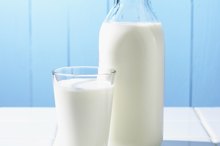Medications That Cause Gallstones
Bile is a liquid containing cholesterol, bilirubin, bile salts and other substances. Gallstones, rock-like material within the gallbladder, form when there is too much cholesterol or bilirubin in the bile or if the gallbladder does not contract normally to expel the bile. Risk factors for gallstones include obesity, a high-fat diet, ethnicity, female gender, pregnancy, older age, diabetes, rapid weight loss and a family history of gallstones. An increased risk of gallstones is also seen when taking some medications.
If you are experiencing serious medical symptoms, seek emergency treatment immediately.
Estrogen-containing Medications
Estrogen increases the amount of cholesterol in the bile as well as decreases gallbladder motility, both of which lead to increased gallstone formation. Administration of any estrogen-containing compound such as birth control pills or hormone replacement therapy for menopause increases the risk of gallstone formation because these compounds lead to excess estrogen and excess bile cholesterol. Hormone replacement therapy using patches, rather than pills, does not carry the same increased risk of gallstone formation.
Cholesterol-lowering Medications
Gallstones, Lecithin & Rowachol
Learn More
Some types of cholesterol-lowering drugs, gemfibrozil and fenofibrate, lower the amount of cholesterol in the bloodstream but increase the cholesterol in bile, leading to increased risk of gallbladder stone formation. Statins, the most popular kind of drugs used for lowering cholesterol, do not have this side effect.
Octreotide
Octreotide is a drug used to treat acromegaly and certain kinds of tumors. This drug decreases gallbladder motility, which, according to Drugs.com, leads to gallstone formation in about 29 percent of people taking octreotide; another 20 percent develop gallbladder sludge 3. The risk of gallstone formation decreases after withdrawal of the drug.
Total Parenteral Nutrition
Fatty Liver and Gallstones
Learn More
Total parenteral nutrition, or TPN, is a pharmacologic mixture of glucose, fatty acids, amino acids and several other vitamins and minerals given intravenously 24 hours a day to people who cannot get enough nutrition by mouth alone 4. The high caloric content of TPN leads to decreased gallbladder motility and gallbladder sludge, significantly increasing the risk of gallstone formation. Stopping the glucose infusion a few hours every day or the addition of certain medications helps decrease gallstone formation in TPN patients.
- Total parenteral nutrition, or TPN, is a pharmacologic mixture of glucose, fatty acids, amino acids and several other vitamins and minerals given intravenously 24 hours a day to people who cannot get enough nutrition by mouth alone 4.
- Stopping the glucose infusion a few hours every day or the addition of certain medications helps decrease gallstone formation in TPN patients.
Related Articles
References
- National Digestive Diseases Information Clearinghouse: Gallstones
- Drugs.com: Octreotide Side Effects
- Merck Manual Professional: Total Parenteral Nutrition
- National Institute of Diabetes and Digestive and Kidney Diseases. (n.d.). Gallstones. https://www.niddk.nih.gov/health-information/digestive-diseases/gallstones
- University of Maryland Medical Center. (2018). Gallstones and gallbladder disease. https://www.umms.org/ummc/patients-visitors/health-library/in-depth-patient-education-reports/articles/gallstones-and-gallbladder-disease
- Njeze GE. Gallstones. Niger J Surg. 2013;19(2):49-55. doi:10.4103/1117-6806.119236
- Maurer KJ, Carey MC, Fox JG. Roles of infection, inflammation, and the immune system in cholesterol gallstone formation. Gastroenterology. 2009;136(2):425-40. doi:10.1053/j.gastro.2008.12.031
- Halpin V. Acute cholecystitis. BMJ Clin Evid. 2014;2014:0411.
- Balmadrid B. Recent advances in management of acalculous cholecystitis. F1000Res. 2018;7: F1000 Faculty Rev-1660. doi:10.12688/f1000research.14886.1
- Ahmed M. Acute cholangitis - an update. World J Gastrointest Pathophysiol. 2018;9(1):1-7. doi:10.4291/wjgp.v9.i1.1
- Derici H, Kara C, Bozdag AD, Nazli O, Tansug T, Akca E. Diagnosis and treatment of gallbladder perforation. World J Gastroenterol. 2006;12(48):7832-6. doi:10.3748/wjg.v12.i48.7832
- Toouli J. Biliary Dyskinesia. Curr Treat Options Gastroenterol. 2002;5(4):285-291.
- Ahmed M, Diggory R. Acalculous gallbladder disease: the outcomes of treatment by laparoscopic cholecystectomy. Ann R Coll Surg Engl. 2011;93(3):209-12. doi:10.1308/003588411X563402
- Shaffer EA. Gallbladder cancer: the basics. Gastroenterol Hepatol (N Y). 2008;4(10):737-41.
- Wang JK, Foster SM, Wolff BG. Incidental gallstones. Perm J. 2009;13(2):50-4.
- Bree RL. Further observations on the usefulness of the sonographic Murphy sign in the evaluation of suspected acute cholecystitis. J Clin Ultrasound. 1995;23(3):169-72.
- Robinson P, Perkins JC. Approach to Patients with Epigastric Pain. Emerg Med Clin North Am. 2016;34(2):191-210. doi:10.1016/j.emc.2015.12.012
- Pejić MA, Milić DJ. [Surgical treatment of polypoid lesions of gallbladder]. Srp Arh Celok Lek. 2003;131(7-8):319-24.
- Genc V, Sulaimanov M, Cipe G, et al. What necessitates the conversion to open cholecystectomy? A retrospective analysis of 5164 consecutive laparoscopic operations. Clinics (Sao Paulo). 2011;66(3):417-20. doi:10.1590/S1807-59322011000300009
- Katzarov AK, Dunkov ZI, Popadiin I, Katzarov KS. How to measure quality in endoscopic retrograde cholangiopancreatography (ERCP). Ann Transl Med. 2018;6(13):265. doi:10.21037/atm.2018.05.01
- Catalano MF, Thosani NC. (2016). Clinical manifestations and diagnosis of sphincter of Oddi dysfunction. Howell DA (ed). UpToDate, Waltham, MA: UpToDate Inc.
- Lee JY, Keane MG, Pereira S. Diagnosis and treatment of gallstone disease. Practitioner. 2015 Jun;259(1783):15-9,2.
- National Institute of Diabetes and Digestive and Kidney Diseases. (n.d.). Gallstones.
- University of Maryland Medical Center. (2018). Gallstones and gallbladder disease.
Writer Bio
Kathy Jutila has been writing health-related articles since 1979. Her work has appeared in "Infection and Immunity," "American Review of Respiratory Diseases," "Inflammation" and "Circulation." Jutila received a Bachelor of Science in biology, and a Master of Science in microbiology from Montana State University. She also holds a Doctorate of Medicine from the University of New Mexico.









